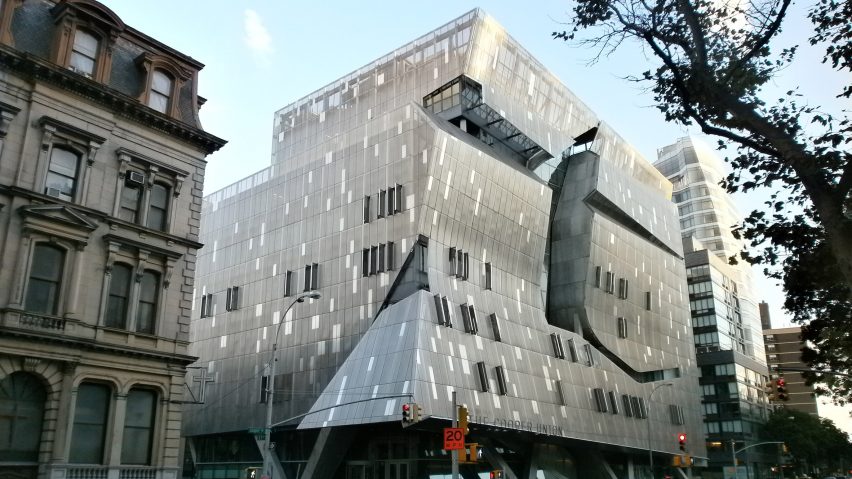
Postponement of Soviet-era exhibition not about "censorship" says Cooper Union
New York's Cooper Union has defended its decision to postpone its Vkhutemas: Laboratory of the Avant-Garde exhibition following a controversial opinion article, which claimed it was inappropriate due to Russia's ongoing invasion of Ukraine.
Focused on the work of the Vkhutemas design school in the former Soviet Union, the exhibition was scheduled to open at the end of January.
However, the exhibition was postponed following an uproar generated by an opinion piece on the website Archinect written by New York University historian Peder Anker, which suggested the exhibition could make Russia "more appealing to the architectural community and New Yorkers".
According to Cooper Union architecture dean Hayley Eber, the debate surrounding the article led to the decision to postpone the exhibition, despite the institution taking issue with a number of claims in the piece, which have since been retracted by Archinect.
"The op-ed that ran the weekend before the exhibition's opening made serious allegations and created the impression the exhibition was an implicit endorsement of Russian policies today," Eber told Dezeen.
"The opinion piece, which was not fact-checked and has since been significantly amended, sparked concerns and continuing dialogue at Cooper, within our community, and the field at large."
"This topic is very much worthy of debate"
Cooper Union was not alone in taking issue with the opinion article. The piece received a large number of critical comments, with several commenters pointing out that the writer Anker had a personal relationship with the exhibition curator Anna Bokov, which was not originally declared within the piece.
In response, Archinect admitted that it had not known of the personal connection between Anker and Bokov at the time of publication, adding the information to an editor's note at the bottom of the article. However, it defended the piece as a whole.
"This topic is very much worthy of debate," it said. "There are countless precedents of Russia-related events being boycotted, canceled, or postponed due to the invasion of Ukraine by Russia last year. This is in no way an endorsement or opposition of this op-ed, on behalf of Archinect. Questioning the appropriateness of this exhibition at this time is worthy of discussion."
In a separate comment, Anker stated: "I have indeed enjoyed a friendship with Anna Bokov for several years, and I still consider her to be a friend."
He continued: "What I am questioning is the ill-timing of the exhibition and the lack of respect for Cooper Union’s Ukrainian neighbors. I believe friends can disagree and still maintain the friendship."
"Chilling impingement of academic freedom"
Now, Copper Union has itself come in for criticism by some in the architectural community for its decision to cancel the exhibition, which would have featured student work examining the Vkhutemas design school that was shut down by Soviet premier Joseph Stalin.
Yesterday, a Google Document-generated letter was published on the website of Art & Education that decried the postponement, expressing "deep concern and disappointment about the Cooper Union’s last-minute decision to postpone indefinitely the opening of the exhibition".
It has seemingly been undersigned by hundreds of prominent designers, including a number of Cooper Union's own students, alumni and faculty, although Dezeen has not been able to confirm the authenticity of the signatures.
The letter supported the original decision to postpone the exhibition last year at the outset of the war but called the recent postponement a "chilling impingement on academic freedom and education".
Decision not about "censorship" or "historical erasure"
However, Eber defended the decision to postpone the exhibition, saying that it would have been "a disservice" to have ploughed ahead with the exhibition among all the heated debate and contention.
"This is not about 'censorship' or 'historical erasure' as has been claimed, two concepts that are antithetical to the core identity and mission of Cooper Union," Eber said.
"Moving forward with the exhibition as planned – without consideration of the diverse perspectives and increasingly sensitized environment through which the work would be considered – would have done a disservice to all involved."
Cooper Union was founded in 1859 and its Morphosis-designed art, engineering and architecture campus is located on the western edge of Manhattan's Ukrainian Village.
"We are in the process of continuing conversations with the exhibition co-curators, our students, and faculty, as well with members of Cooper's Ukrainian community as we plan a way forward," said Eber.
"Plans for the project will be shared once we have had time and space to consider these issues thoughtfully and sensitively."
Russia's invasion of Ukraine began in late February 2022. The onset of the war resulted in a significant halting of Russia-based projects by outside architecture studios like MVDVR and has drawn criticism from Russian architects.
The photography is by Gip3798 via Wikipedia Commons.